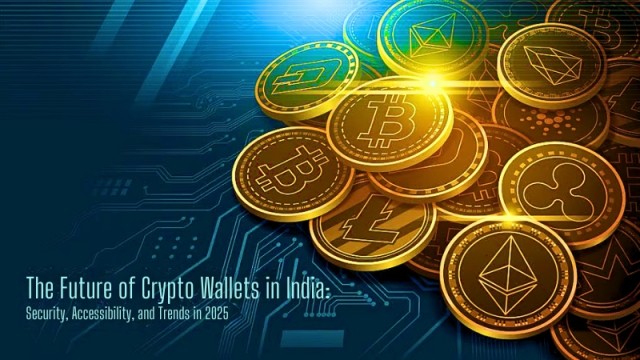The cryptocurrency landscape in India is evolving rapidly, and by 2025, crypto wallets are expected to play a pivotal role in shaping how Indians interact with digital assets. From enhanced security features to improved accessibility, the future of crypto wallets in India is set to revolutionize the way users store, manage, and transact cryptocurrencies. Let’s dive into the key trends and developments that will define this space in the coming years.
1. Enhanced Security Features
As cryptocurrency adoption grows, so does the need for robust security measures. By 2025, crypto wallets in India are likely to integrate advanced security features such as:
- Multi-Factor Authentication (MFA): Adding an extra layer of protection to prevent unauthorized access.
- Biometric Verification: Using fingerprint or facial recognition for secure logins.
- Hardware Wallet Integration: Combining the convenience of software wallets with the security of hardware wallets.
- AI-Powered Threat Detection: Real-time monitoring to identify and prevent potential security breaches.
With cyber threats on the rise, these innovations will ensure that users’ digital assets remain safe and secure.
2. Improved Accessibility for the Masses
By 2025, crypto wallets in India are expected to become more user-friendly and accessible to a broader audience. Key developments include:
- Local Language Support: Wallets offering interfaces in regional languages to cater to India’s diverse population.
- Simplified Onboarding: Streamlined KYC processes and easy-to-understand tutorials for first-time users.
- Affordable Hardware Wallets: Cost-effective solutions to make hardware wallets accessible to the average Indian investor.
- Integration with UPI: Seamless integration with India’s Unified Payments Interface (UPI) for easy fiat-to-crypto transactions.
These advancements will democratize access to cryptocurrencies, enabling even non-tech-savvy individuals to participate in the digital economy.
3. Emerging Trends in Crypto Wallet Technology
The crypto wallet ecosystem in India is poised to witness several groundbreaking trends by 2025:
- Decentralized Wallets: Increased adoption of non-custodial wallets, giving users full control over their private keys.
- Interoperability: Wallets supporting multiple blockchains, allowing users to manage various cryptocurrencies in one place.
- DeFi Integration: Direct access to decentralized finance (DeFi) platforms for earning interest, staking, and lending.
- NFT Storage: Dedicated features for storing and managing non-fungible tokens (NFTs), catering to India’s growing NFT community.
- Quantum-Resistant Encryption: Preparing for the future by implementing encryption methods resistant to quantum computing threats.
These trends will not only enhance functionality but also position India as a global leader in crypto wallet innovation.
4. Regulatory Impact on Crypto Wallets
By 2025, India’s regulatory framework for cryptocurrencies is expected to mature significantly. This will have a direct impact on crypto wallets, including:
- Mandatory Compliance: Wallets adhering to strict KYC and AML regulations to ensure transparency and legality.
- Government-Backed Wallets: Potential introduction of wallets linked to India’s Central Bank Digital Currency (CBDC), the Digital Rupee.
- Taxation Tools: Built-in features to help users calculate and report taxes on crypto transactions.
A clear regulatory environment will boost user confidence and drive mainstream adoption of crypto wallets in India.
5. The Role of Crypto Wallets in Financial Inclusion
Crypto wallets have the potential to bridge the gap between India’s banked and unbanked populations. By 2025, they could:
- Provide access to financial services for individuals in remote areas.
- Enable low-cost cross-border remittances for migrant workers.
- Offer microloans and savings options through DeFi integrations.
This transformative potential aligns with India’s vision of a digitally empowered economy.
Conclusion
The future of crypto wallets in India is bright, with advancements in security, accessibility, and technology set to redefine the digital asset landscape by 2025. As regulations evolve and adoption grows, crypto wallets will become an indispensable tool for millions of Indians, empowering them to participate in the global crypto economy securely and efficiently.
By staying ahead of these trends, Indian users and businesses can unlock the full potential of cryptocurrencies and blockchain technology.
Frequently Asked Questions About The Future of Crypto Wallets in India
Q1. What is a crypto wallet, and why do I need one?
Answer: A crypto wallet is a digital tool for storing, sending, and receiving cryptocurrencies securely. It uses a public key to receive funds and a private key to access and manage assets. You need a wallet to safely interact with blockchain networks and manage your digital investments.
Q2. Are crypto wallets legal in India?
Answer: Yes, crypto wallets are legal in India. While cryptocurrency regulations are still evolving, using wallets to store and manage digital assets is allowed. Users must comply with KYC and AML regulations when using certain wallet services.
Q3. What are the different types of crypto wallets available in India?
Answer: Crypto wallets in India include hot wallets (connected to the internet), cold wallets (offline storage), custodial wallets (managed by third parties), and non-custodial wallets (user-controlled). Each type offers varying levels of security and convenience.
Q4. How can I ensure the security of my crypto wallet in India?
Answer: To secure your crypto wallet, use strong passwords, enable two-factor authentication, store private keys offline, avoid suspicious links, and keep your wallet software updated. These steps help protect against hacks and theft.
Q5. What are the future trends for crypto wallets in India by 2025?
Answer: By 2025, crypto wallets in India will feature advanced security like biometric authentication, support for multiple blockchains and DeFi platforms, local language options, UPI integration, and compliance with regulations like CBDC (Digital Rupee) adoption.
Disclaimer:
This blog post is for informational purposes only and does not constitute financial, legal, or investment advice. We do not guarantee accuracy, reliability, or security. Any actions taken based on this content are at your own risk. Always conduct your own research and consult a professional before making decisions.

